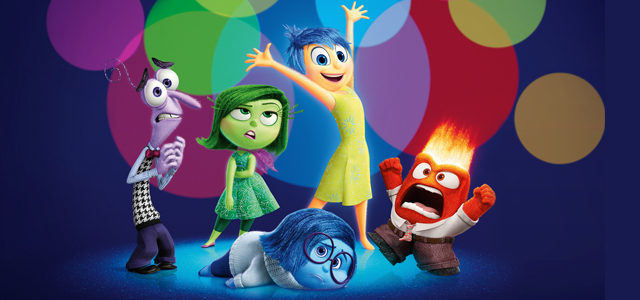(PG) Starring: the voices of Amy Poehler, Phyllis Smith, Bill Hader
It is not easy to understand the emotions of children, but what if you were able to see their emotions being played out on the big screen? Directors Pete Docter (UP) and Ronaldo Del Carmen’s new film Inside Out allows us to see into the turbulent, but humorous world of the pre-teen emotional landscape.
Riley is the focus of this emotional tale and she is going through a multitude of changes in her life. Things get even more challenging when her family moves from her Minnesota home to the unknown of San Francisco. As she is growing older, these new situations wreak havoc on the emotional battlefield of Riley and her family. Over the initial days of their arrival at their new home and Riley at her new school, her emotions — Joy (Amy Poehler), Fear (Bill Hader), Anger (Lewis Black), Disgust (Mindy Kaling) and Sadness (Phyllis Smith), who all live in Riley’s “Headquarters” (her brain) — try to navigate her through the emotional minefield of the past and present. Then an emotional catastrophe leads to the mixing of her emotions, her memories and her responses to life which have the potential to lead to significant, life changing results.
My wife and I have raised three daughters who have experienced similar stages of life as Riley. This flurry of emotions came alive on screen in a hilarious, but personal way. Inside Out‘s story felt simplistic and child-like, which made sense because the emotions at the core of the film are those of a pre-teenager. They are not mature characters; these “emotions” are growing at the same rate as the child they exist within. This is explained in finer detail when we are also able to see the emotional landscape of Riley’s parents. They contain similar “emotion” characters inside their “headquarters”, but these have a depth of experience that has not occurred yet in Riley’s life.
Inside Out itself is quite a different experience than most animated films and it is handled in a similarly mature fashion to UP. This style of storytelling causes a shift in understanding about what Inside Out is trying convey which, ultimately, is the maturing of a young girl into adulthood. Be warned, then, anyone who goes into this film expecting a typical Disney film. Without sounding too obvious, this film will play on your emotions. It may cause you to consider all you have forgotten; the many things that have influenced your life; and how joyful emotions are maybe even sweeter when mixed with a bit of sadness. Our family really enjoyed this film, but had to take the time to consider what it all meant to us — and what it will mean for our youngest child in the future.
The writing and directing of the lead characters bring the necessary qualities of Pixar films we have come to love over the years. Inside Out is funny and well written, which caused laugh-out-loud moments, potential times of fear and a multitude of tears throughout the theatre.
In the same vein as UP, the themes of Inside Out are intended for the tween-to-adult audience, but it still can be enjoyed by younger children. The younger set may need some explanations of the deeper emotional elements on screen.
Inside Out falls squarely in the middle of the pack of Pixar ‘s quality productions. It’s not Pixar’s best but is still an excellent film that delivers a joyful experience for the family.
What are the bigger questions to consider from this film?
2. What does the Bible say about maturity? (1 Corinthians 14:20, Ephesians 4:14-15)
Russell Matthews works for City Bible Forum Sydney and is a film blogger














